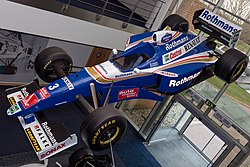
Back Williams FW19 Catalan Williams FW19 German Williams FW19 Spanish Williams FW19 Finnish Williams FW19 French Williams FW19 Hungarian Williams FW19 ID Williams FW19 Italian ウィリアムズ・FW19 Japanese Williams FW19 Polish
 The FW19 of Jacques Villeneuve at the Williams Conference Centre | |||||||||||
| Category | Formula One | ||||||||||
|---|---|---|---|---|---|---|---|---|---|---|---|
| Constructor | Williams (chassis) Renault Sport (engine) | ||||||||||
| Designer(s) | Patrick Head (Technical Director) Adrian Newey (Chief Designer) Geoff Willis (Chief Aerodynamicist) Bernard Dudot (Chief Engine Designer (Renault)) | ||||||||||
| Predecessor | Williams FW18 | ||||||||||
| Successor | Williams FW20 | ||||||||||
| Technical specifications | |||||||||||
| Chassis | Carbon-fibre and honeycomb composite structure | ||||||||||
| Suspension (front) | Williams inboard torsion bar, double wishbone, operated by a push-rod bellcrank | ||||||||||
| Suspension (rear) | Williams inboard coil-spring/double wishbone, operated by a push-rod bellcrank | ||||||||||
| Engine | Mecachrome-built Renault RS9 / RS9A / RS9B 3.0-litre V10 (71°), naturally-aspirated, mid-engined | ||||||||||
| Transmission | Williams/Komatsu 6-speed transverse sequential semi-automatic | ||||||||||
| Power | 730–760 hp (544–567 kW; 740–771 PS) @ 17,000 rpm[1][2] | ||||||||||
| Fuel | Elf | ||||||||||
| Lubricants | Castrol | ||||||||||
| Tyres | Goodyear | ||||||||||
| Competition history | |||||||||||
| Notable entrants | Rothmans Williams Renault | ||||||||||
| Notable drivers | 3. 4. | ||||||||||
| Debut | 1997 Australian Grand Prix | ||||||||||
| First win | 1997 Brazilian Grand Prix | ||||||||||
| Last win | 1997 Luxembourg Grand Prix | ||||||||||
| Last event | 1997 European Grand Prix | ||||||||||
| |||||||||||
| Constructors' Championships | 1 (1997) | ||||||||||
| Drivers' Championships | 1 (1997, Jacques Villeneuve) | ||||||||||
The Williams FW19 was the car with which the Williams team competed in the 1997 Formula One World Championship. It was driven by Jacques Villeneuve, in his second year with the team, and Heinz-Harald Frentzen, who moved from Sauber to replace the dropped 1996 champion, Damon Hill. Williams also employed test drivers Jean-Christophe Boullion and Juan Pablo Montoya.
To this date, the FW19 remains the last Williams car to win either championship.[3] It was also the last Renault-powered Formula One car to win a world championship title until the Renault R25 in 2005.
- ^ "3rd Naturally-Aspirated Era (3NA), Part 2, 1995-2000 (end of this review)" (PDF). grandprixengines.co.uk. Retrieved 4 May 2024.
- ^ "Formula 1's 5 Most Iconic Engines ever". 26 February 2021.
- ^ "Williams • STATS F1". www.statsf1.com. Retrieved 3 February 2024.